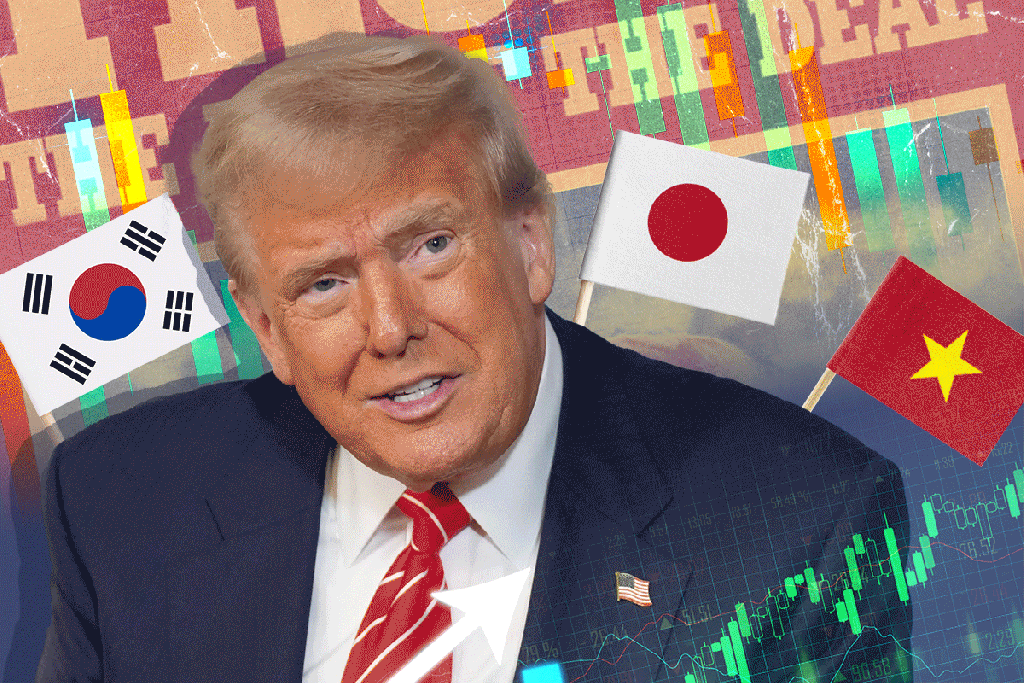Remember those simpler times when markets were focused on tariffs instead of war?
Well, with the markets starting to look past the 12-day flareup between Israel and Iran, and our involvement in (hopefully) decapitating Tehran’s nuclear efforts, tariffs might soon be back on the table for another round of market-induced ruction, On The Money has learned.
Team Trump says it’s close to announcing a handful of trade deals, my Wall Street sources with contacts in the White House tell me.
I know we’ve heard this before without much real progress, but the big ones that the White House says they’re making headway on involve Japan, as well as South Korea and Vietnam, these people say.
India was thought to be a done deal, but its armed conflict, however brief, with Pakistan threw off the talks with US trade negotiators. That deal could re-emerge but it’s not on the list of those that are pending, the sources say.
“They’re supposed to be coming up in the next few weeks,” is how one of my Wall Street sources described the current situation. “India seems to be moving a bit slower. But deals are supposedly coming.”
July 9 is a key date. It’s when Trump’s tariff pause against most trading partners ends. China’s tariff pause ends Aug. 12. In the meantime, we could get some more extensions or rushed frameworks, my Wall Street sources suggest.
The Japan deal appears most promising since the Trump administration just approved the takeover of US Steel by Japan’s Nippon Steel, with the proviso that the White House hold what’s known as a “golden share,” a special category of stock in the new company that gives the US some authority over decision-making.
Yes, a little bit of socialism from the alleged free market types in the White House, but it’s suggesting a broader trade deal with the Japanese is in the works, my sources say.
The impetus behind a deal with Vietnam is that it could be a place where US businesses set up if they leave China, one of our major trade adversaries. Plus, the Trump Organization has looked at investment in the Communist country. The Vietnam War is a distant memory as Hanoi continues integrating capitalism into its economy and seeking closer ties with the US.
South Korea, meanwhile, is a long-time ally and the trade talks with the country have been progressing, sources said.
Remember, if and when all of the above happens, these won’t be official deals, but frameworks much like the one crafted with the UK that sets conditions before various regulatory reviews take place and deals are, as they say, sealed. But they could be a market positive because they should produce levies that are lower than what Trump originally demanded in his “Liberation Day” tariffs attack against the world on April 2.
They should also provide US businesses with some clarity on the cost of importing goods from major trading partners.
That said, making tariffs the focus could have some negative market consequences since investors have been focused on a possible peace dividend from a defanged Iran.
The potentially inflation-inducing costs on many goods consumed by average Americans from tariffs could once again weigh heavily on the economy.
Recall how stocks and bonds tanked over fears of inflation and a possible economic slowdown from a tariff-induced price shock. Trump has since paused his tariff regime until deals could be worked out, but the zig-zagging nature of the talks are starting to weigh on business and consumers.
Retailers like Walmart, who rely on cheap goods imported from China, have raised prices even as intense trade negotiations between Treasury Secretary Scott Bessent and Beijing continue.
The latest consumer confidence numbers sank a bit, another likely indication that costs are being passed on.
Fed Chair Jerome Powell has ruled out cutting interest rates until he sees if the tariffs will induce inflation, and presumably on what deals Team Trump is cutting. And it’s unclear if those talks are proceeding favorably with what might be the country’s most important trade partner given its large consumer base and ability to manufacture stuff that is too costly to build here.
That would be China. Even though we are economic and maybe military adversaries, we need each other, and China President Xi Jinping is a tough negotiator. A deal with the European Union, another major trading partner, is also slow going.
Seems like for better or worse, trade will be back moving markets.
Read the full article here
